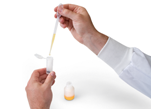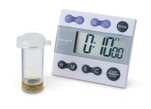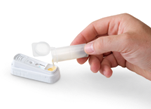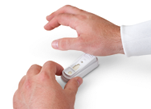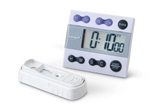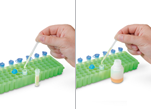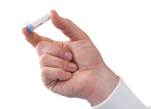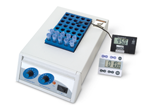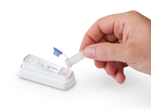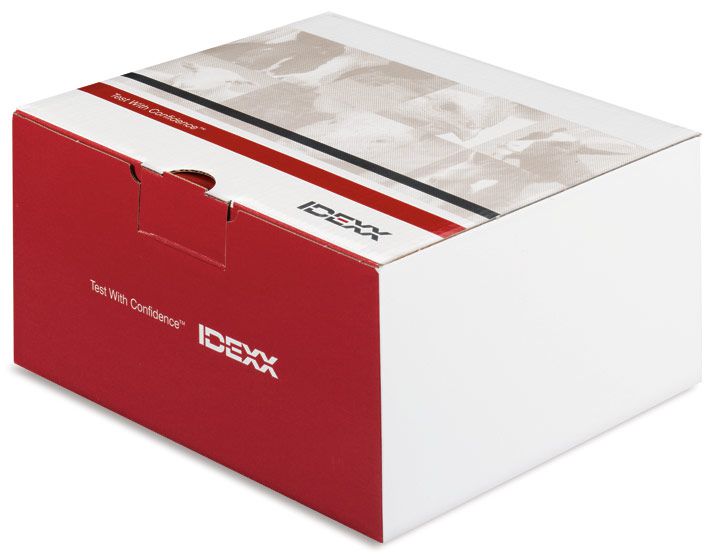
Box sizes and labels will vary.
IDEXX SNAP BVDV Antigen Test
Bovine Viral Diarrhea Virus (BVDV)
The IDEXX SNAP BVDV Antigen (Ag) Test helps identify bovine viral diarrhea virus-infected cattle in just 20 minutes to prevent the spread of BVDV. By testing all newborn calves, replacements and bulls, veterinarians can help producers ensure the safety of the entire herd and add market value.
Sellers of BVDV-tested calves earned, on average, $10 per head more at auction after the cost of testing.1
Read a case study on how backgrounder Justin Weichel "cut antibiotic usage by more than 75%, death loss by 81%, and saw a 40% increase in weight gain" with the SNAP BVDV Antigen Test .
* Availability / Distribution: US/Canada Only
Test details
Features
- Serum or ear-notch tissue samples
- Erns antigen detection
- Results in 20 minutes
Part numbers and sizes
99-0010876 (25 tests/box)
About Bovine Viral Diarrhea Virus (BVDV)
Bovine viral diarrhea virus (BVDV) suppresses a cow's immune system, making the animal susceptible to a host of other infections. That's why BVDV is one of the world's most costly bovine diseases, with losses of $15–$88 per head from reduced herd productivity, health and reproductive efficiency.1
Stopping BVDV requires detecting and removing the infection source: persistently infected (PI) cattle that continually expose other animals to disease.
Because PI cattle often look healthy, a sensitive, specific diagnostic test is essential. Mistakes can be costly: whether it's removing a valuable animal from production or allowing an infected calf to join the herd.
Determining herd status is the first step toward a BVDV-free herd. IDEXX has a complete portfolio of BVDV tests, including antibody- and antigen-detection ELISAs for laboratories and rapid SNAP and point-of-care tests for veterinarians. The IDEXX BVDV PI X2 Test and the rapid IDEXX SNAP BVDV Antigen Test are USDA-licensed.
View veterinarian testimonials on BVDV testing.
IDEXX recommends a simple three-step management plan
1
Determine your herd status using the IDEXX BVDV PI X2 Test at a local laboratory.
2
Test all new introductions to the herd using the IDEXX SNAP BVDV Ag Test.
3
Work with your veterinarian to design a vaccination and biosecurity program.
Note: IDEXX recommends using the SNAP BVDV Ag Test in conjunction with your local laboratory for high-volume herd surveillance to determine status.
Pocket guide: Keeping BVDV Out of Your Herd
Pocket guide: Keeping BVDV Out of Your Feedlot
The IDEXX SNAP BVDV Ag Test in action
See how simple BVDV testing can be with ear-notch sampling.
Reduce risk and increase ROI with the IDEXX SNAP BVDV Ag Test
Benefits
Fast, easy an accurate testing for the detection of BVDV.
Rule out BVDV infection
- Test all new introductions to the herd—newborn calves, replacements and bulls
- Identify persistently infected (PI) animals in the herd
Easy to run
- Flexible sample types (ear notch or serum)
- Run on farm or back at the clinic
- Simple test protocol utilizes reliable IDEXX SNAP® platform
Rapid, results in 20 minutes
- Diagnosis accurately for same-day treatment recommendation
- Antigen test uses enzyme-linked immunosorbent assay (ELISA) technology
Accuracy
Dependable results for ear-notch and serum samples
The IDEXX SNAP BVDV Antigen Test is a highly sensitive and specific test. Its performance is matched to the widely used IDEXX BVDV PI X2 Test.
Sensitivity and Specificity

How To / Resources
Before you begin
Allow all components to come to room temperature (18–30°C).
Test procedures
Large Ear-Notch Test
Step 1
Dispense 1.5 mL of conjugate into a vial containing a single ear notch.
Step 2
Cap vial and swirl gently to soak ear notch.
Step 3
Incubate vial at room temperature (18–30°C) for at least 10 minutes (range: 10-60 minutes).
Step 4
Pour liquid contents of the vial into the sample well of the SNAP® device.
Step 5
When color first appears in the activation circle (may take 15–60 seconds), press firmly to activate. You will hear a distinct “snap.” Note: some liquid may remain in the sample well.
Step 6
Wait 10 minutes, then read results (range: 10–15 minutes).
Serum Test
A heating device is needed (such as a heater block, water bath, etc.) capable of maintaining a temperature of 45 +/- 5°C
Step 1
Dispense 3 drops (150 µL) of serum sample into a sample tube; using a fresh pipette, dispense 6 drops (200 µL) of conjugate into the sample tube.
Step 2
Cap the sample tube and gently invert 3–5 times to mix.
Step 3
Place the sample tube in a heater block and incubate for 10 minutes at 45°C (range: 10–20 minutes).
Step 4
Pour the contents of the sample tube into the sample well of the SNAP device.
Step 5
When color first appears in the activation circle (may take 15–60 seconds), press firmly to activate. You will hear a distinct “snap.” Note: some liquid may remain in the sample well.
Step 6
Wait 10 minutes, then read results (range: 10–15 minutes).
Interpreting results
Assay is valid if:
- Positive control spot is blue
- Negative control spot has no color development
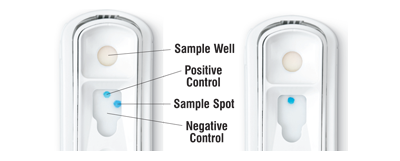
Questions and answers
An easy-to-use test that detects high levels of bovine viral diarrhea virus (BVDV) antigen in ear-notch and serum samples within 20 minutes. The test is based on the same trusted enzyme-linked immunosorbent assay (ELISA) technology that is used in SNAP® tests for small-animal practices and laboratories.
The SNAP BVDV Test is a highly sensitive and specific test. The performance is matched to the widely used IDEXX BVDV Ag Test.
The SNAP BVDV Test can be run with small or large ear-notch samples or serum samples. We recommend you choose a large ear-notch sample, as this sample type delivers results in 20 minutes without any interference from maternal antibodies. Refer to the product insert for more information.
Positive results from this assay are valid for calves of any age. Serum should be obtained from precolostral newborn calves or calves older than 3 months of age to prevent the presence of maternal anti-BVDV antibodies from interfering with the SNAP BVDV Test. For more information, please refer to the product insert or contact IDEXX Technical Services.
Yes, vaccination is not enough to eliminate BVDV. Along with vaccination and biosecurity programs, testing new introductions to the herd can help stop the spread of the disease.
It’s highly unlikely that the SNAP BVDV Test would detect anything other than a persistent infection (PI). In most acute cases, the levels of BVDV antigen are expected to be lower and shorter in duration than in persistent infections. However, IDEXX encourages you to confirm a positive result with a second test as outlined in the product insert—especially for high-value animals.
We recommend opening the foil pouches immediately before planned usage. However, IDEXX research has found no statistical difference in performance between SNAP® devices handled according to the product insert.
Yes, the SNAP BVDV Test should be run on all new introductions to the herd at calving or with replacement heifers. However, IDEXX recommends using your local laboratory for high-volume herd testing.
We recommend refrigerating the box upon arrival at your clinic. Please call IDEXX Technical Services with any specific concerns.
The test requires room temperature and a controlled environment. Conditions like excessive sun or rain can affect the accuracy of the result. We suggest running the test inside, for example, the farm office or back at your clinic.
No, at this time the SNAP BVDV Test is not compatible with any IDEXX SNAP Readers. You must read the results visually
No, formalin-fixed tissues cannot be run on the SNAP BVDV test. Formalin will destroy the antigen signal and result in a false-negative test.
No, the SNAP BVDV Test is validated and USDA-approved for individual ear-notch samples and individual serum samples. Pooling samples results in a loss of sensitivity and leads to false- negative results. Further, samples in a pool with neutralizing antibodies could also lead to false- negative results. When testing for BVDV PI animals, it is important not to pool samples on any test.
* Not all products are available and/or registered in every country.
Reference
1. Where’s the value? Drovers CattleNetwork. http://www.cattlenetwork.com/drovers/Wheres-thevalue-195684561.html Accessed September 4, 2013
2. Data on file at IDEXX Laboratories, Inc., Westbrook, Maine, USA.
